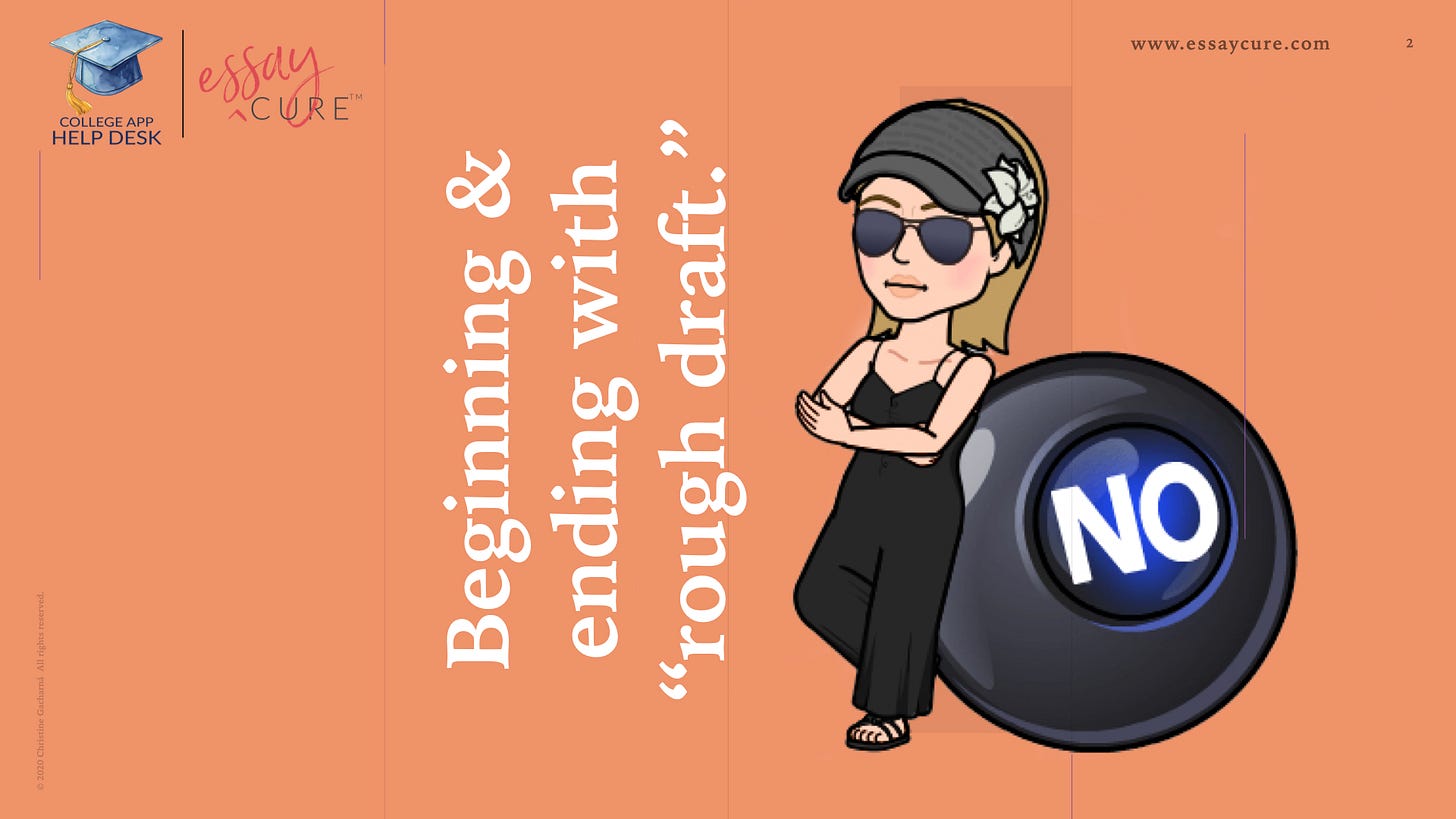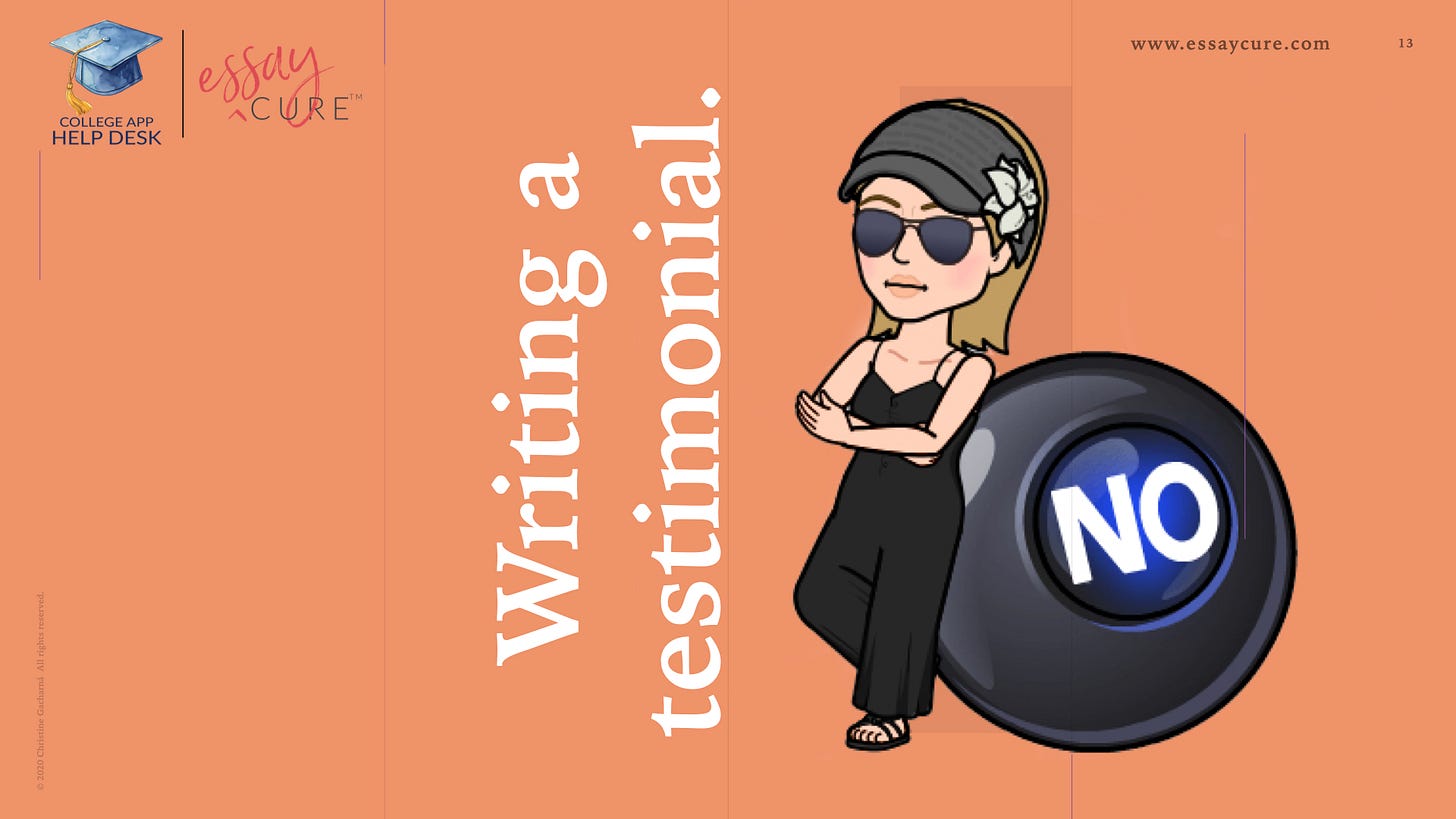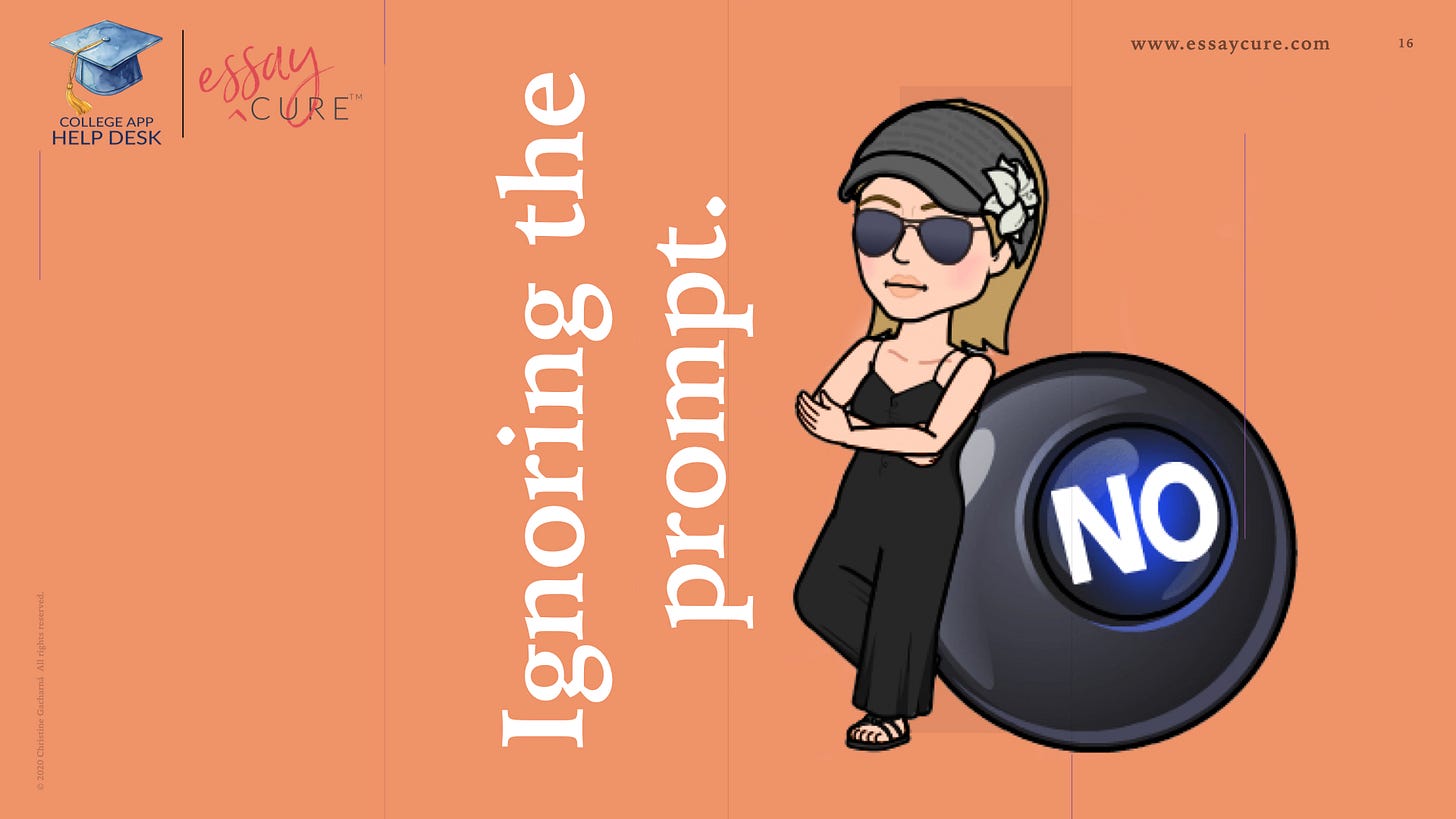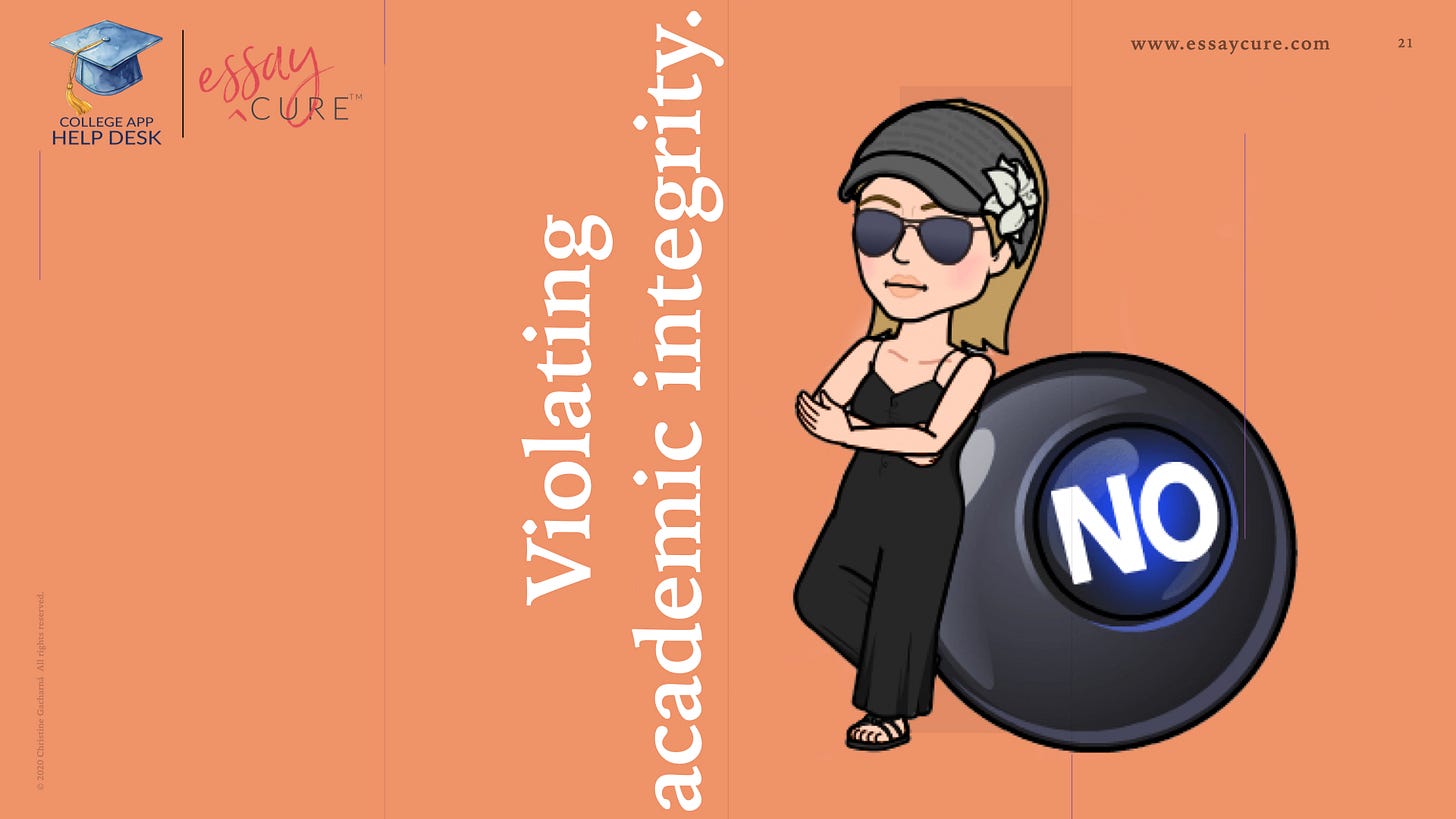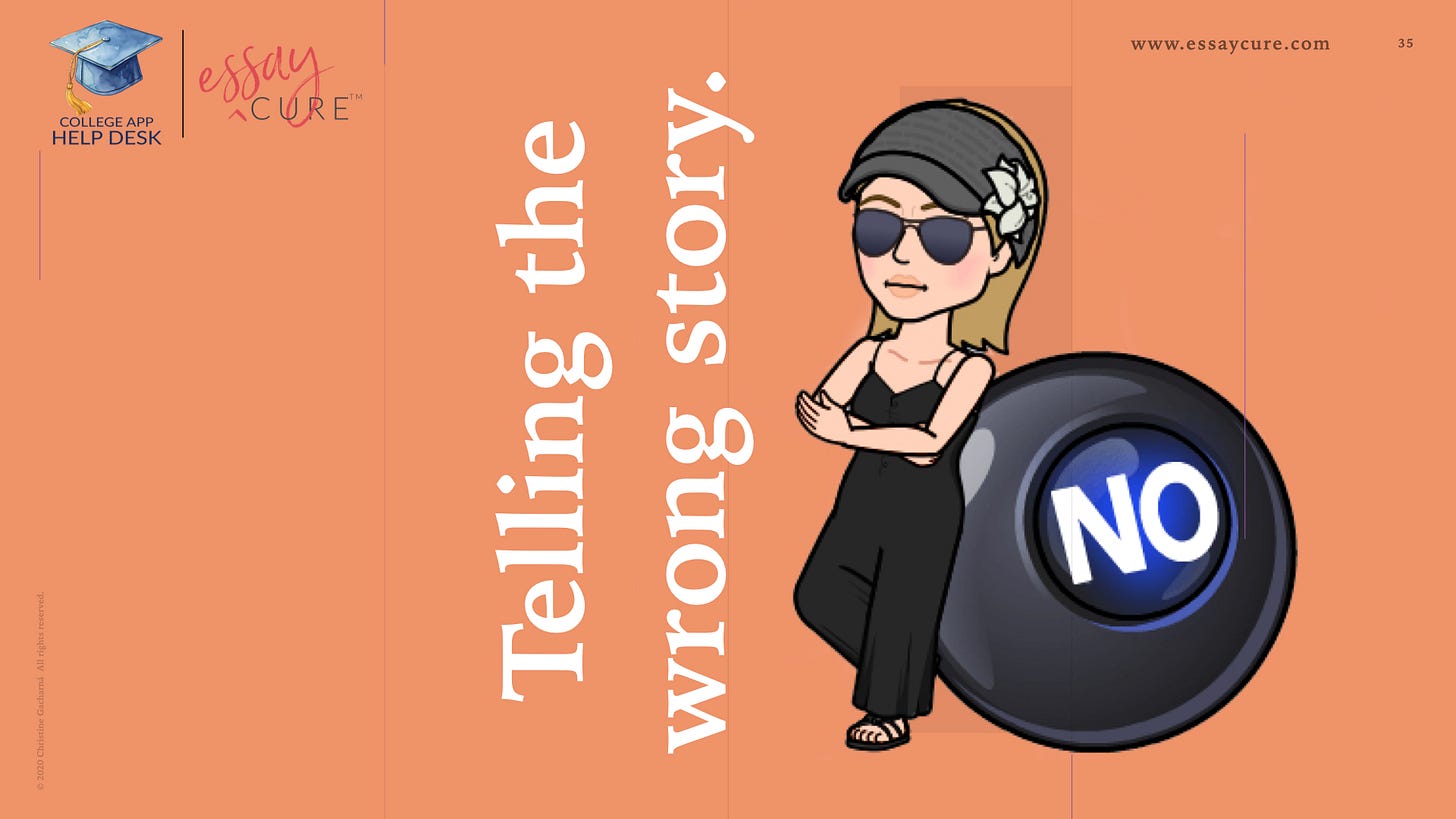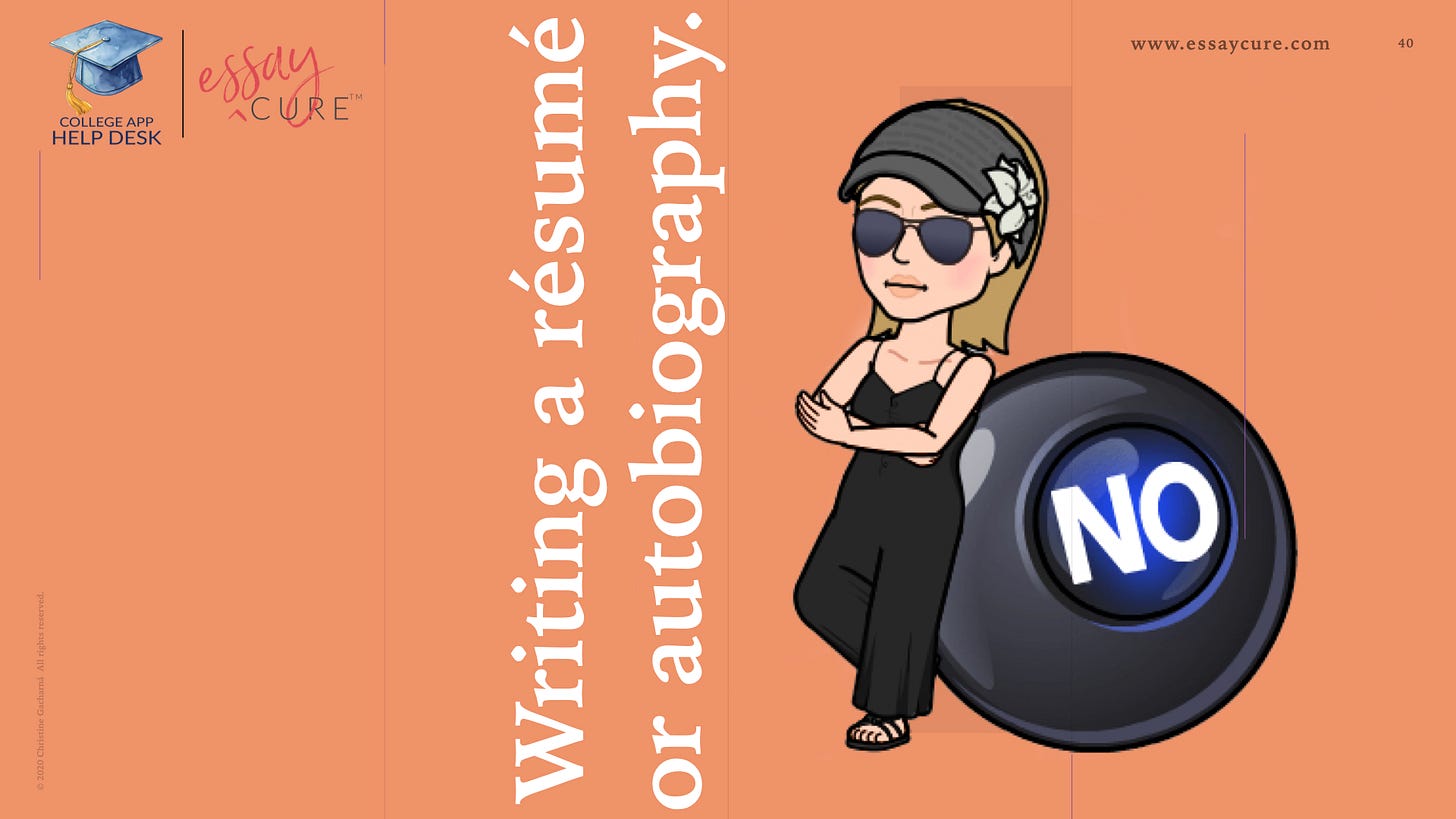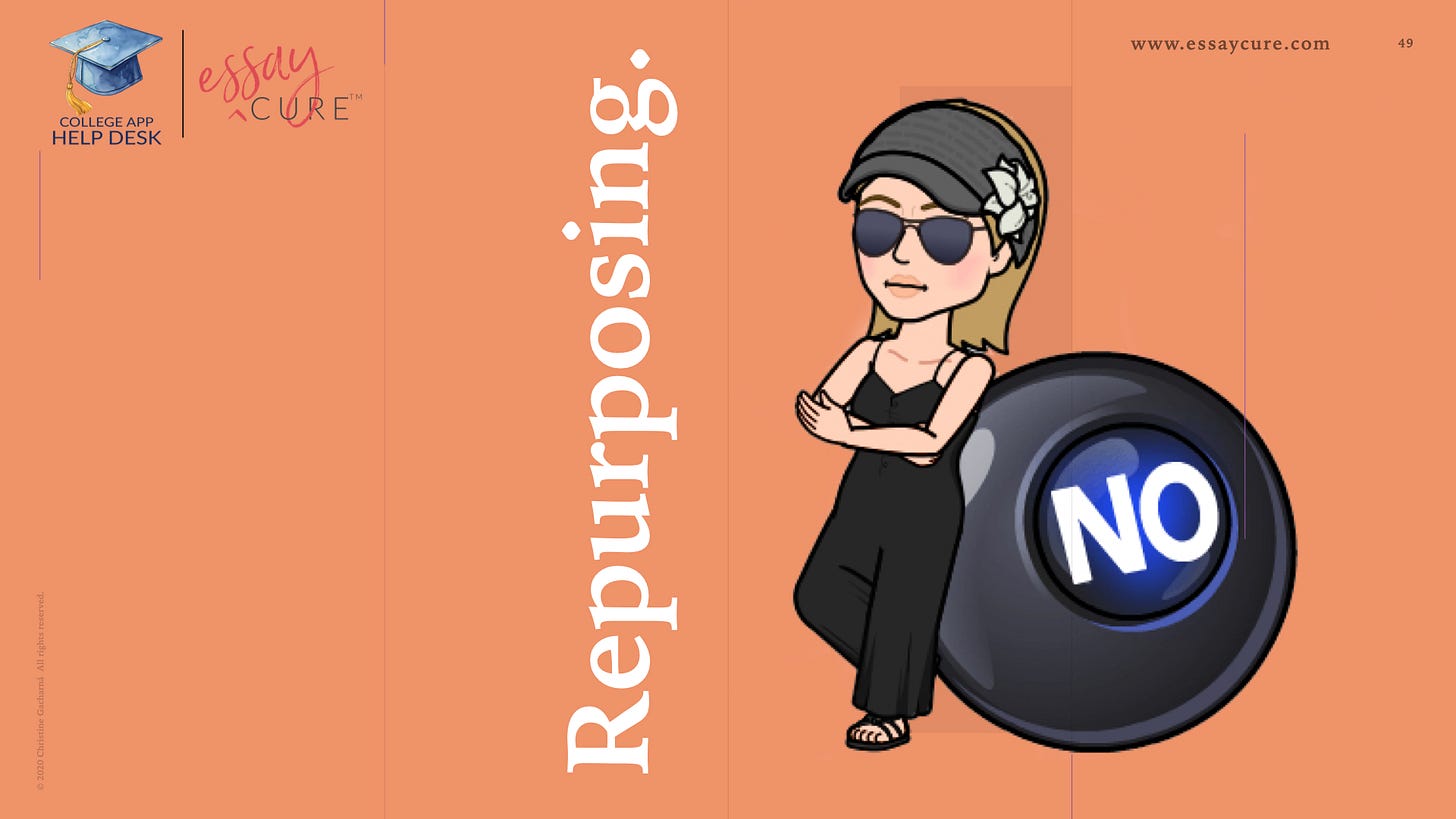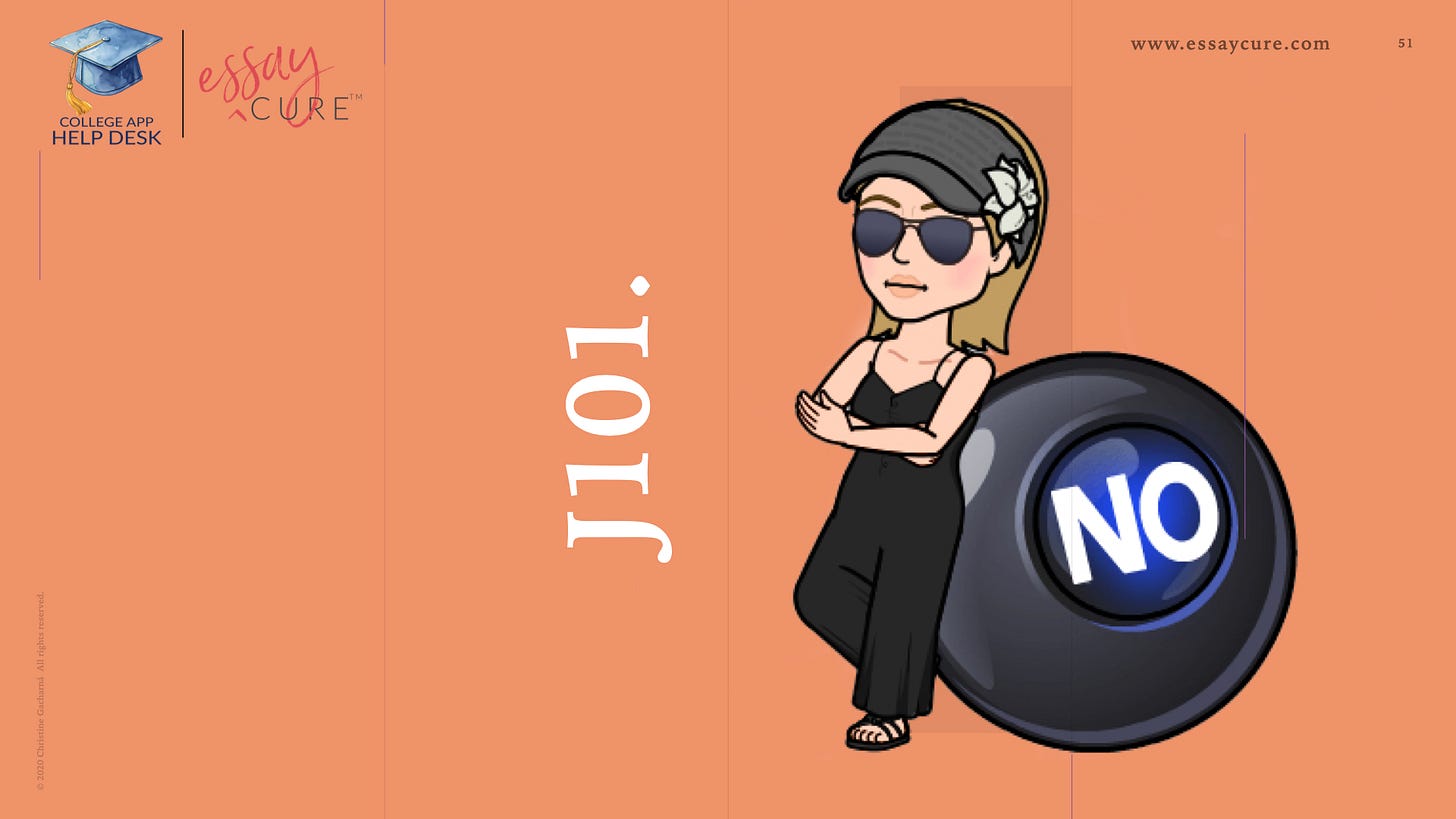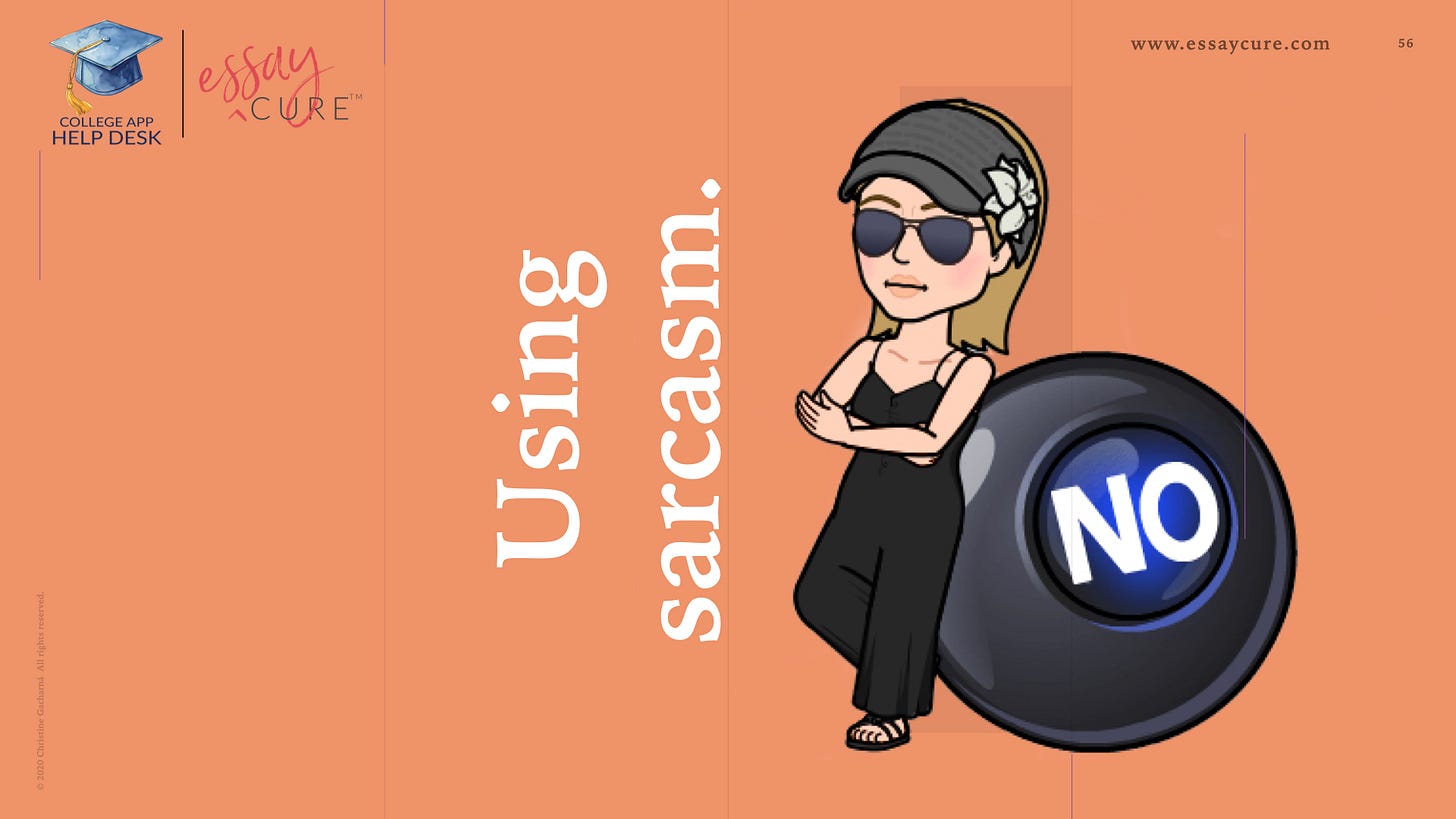Writing a college application essay can feel intimidating and stressful — but it doesn’t have to! Whether you’ve already started brainstorming or just staring at a blank screen, knowing what not to do can save you time and frustration. Below are five of the most common mistakes students make — and how to avoid them.
1. Starting (and Ending) with “Rough Draft”
Great essays are built by working through The Steps in the Writing RIGHTING Process. Many students skip important steps in the writing process and jump straight into “writing a rough draft.” Writing an effective essay is about thinking, reflecting, and planning.
Before you start writing, make sure to:
Understand exactly what the prompt is asking.
Choose a topic/story that reveals who you are and what you value. (Think: Soundbite)
Plan your organization (outline) based on the correct rhetorical mode & organizational method.
Freewrite. Freewriting is an essential part of the essay process, helping students to unlock ideas, find their voice, and overcome perfectionism early in drafting.
2. Focusing on Grammar Too Early
Worrying about commas and punctuation before your ideas are clear is like brushing your teeth before eating dessert. Use the 80/20 Rule of Writing RIGHTING: spend 80% of your time on content and organization, and only 20% on editing mechanics. Communicate. Navigate. Punctuate.©
Tip: Get your ideas and structure right first — then polish your grammar.
3. Writing a Testimonial Instead of a Personal Story
It’s natural to want to write about someone who inspired you — a coach, teacher, or parent — but the essay isn’t about them; it’s about you.
Don’t tell someone else’s story. You can include others, but only in the context of how their influence helped shape your actions, choices, or growth.
Ask yourself, does this essay teach the reader about me or about them?
Review “You Thank” and use what you’ve written to hand this person a heartfelt thank you note.
4. Ignoring the Prompt
It seems this would go without saying, but you’d be surprised. Answer. The. Question.
Every essay prompt is “prompting” you to discuss a specific idea or experience. Make sure your essay:
Clearly responds to the question being asked.
Keeps a clear, focused message throughout.
Stays within the word count limit.
Rule of thumb: If you can’t answer the question the prompt is asking in a single sentence, out loud, it’s likely you won’t be able to write a compelling essay on that topic. Return to freewriting.
5. Submitting Inauthentic Work
Having someone else write your essay — or borrowing someone else’s ideas — might seem like a tempting shortcut, but it’s a major mistake. Admissions officers can easily detect essays that don’t sound like a teenager’s authentic voice — or worse, plagiarized.
Plagiarism checkers on the faculty side are far more robust than they are on the student side.
Parents: If you are writing your student’s college application essay, you are not “helping” your student; you are sending the message to your student that they are not capable of doing this work, robbing them of an opportunity to earn their acceptance letters.
The essay is a student’s chance to show who you are, not who someone else thinks you should be.
Colleges value honesty, self-awareness, and genuine reflection far more than perfection, and many have academic honor codes that you’ll agree to when submitting your application (whether or not you read the fine print.)
6. Telling Me Your Passion
The word “passion” is so overused in college application essays.
Show me. Don’t tell me. Your high school teachers have been telling you this for years.
“Don’t TELL ME the moon is shining; SHOW ME me the glint of light on broken glass.”
—Anton Chekhov
The word “passion” is a noun; use active verbs, not nouns and adjectives, to write your college application.
Replace “verbs of being” (is, are, was, were, am, be, been) with strong, active verbs. Be specific. Use concrete details, personal stories, unique examples only you could write.
Don’t tell UPenn about Upenn. Don’t tell Penn State about Penn State. (They already know.)
7. Telling The Wrong Story
Desperation
Hesitation
Risqué
Braggadocio
Perspective
Controversy
Choose your own Soundbite.
Protect your privacy (HIPAA, FERPA.)
Don’t use the word “you.” You can only speak for yourself in these essays. You have no idea who your audience will be, and you want to avoid alienating or offending your reader, so every statement needs to be in the first person, not the third.
8. Writing a résumé or autobiography
The Common App essay is not a list of all your accomplishments. It’s not “The Life and Times of Student Name.” It’s not a “Why Major?” essay.
Think of the Common App essay as a slice of pie — it’s a sliver of time, a small snippet of a story that tells a larger story about the flavor of your life.
9. Using literary devices
The Common App essay is not an application for an MFA in Creative Writing. It’s a job interview.
Admissions officers are busy people. Application essay readers read tens of thousands of essays. Connect the dots. Draw a line from A to B.
Avoid:
Creating suspense
building themes
Metaphors
Dialogue
Alliteration
foreshadowing
10. Repurposing
Every application deserves a fresh approach.
11. J101
The Catch-22 here is that students won’t be able to get the information they need from Journalism 101 to write their college application essay until after they are in college — but first, they have to get in!
Just because it happened to you doesn’t make it interesting. (I know. That’s way harsh, Tai.) The first time any student hears it, it stings.
Trust me on this. The older, more educated, more experienced you become, the more you will understand and appreciate being told this — you may even be grateful to have the heads-up to avoid making the mistake catastrophic.
Students tend to bury the lede, and some fatally overwork an essay.
“I know that one of the great arts that the writer develops is the art of saying, ‘No. No, I’m finished. Bye.’ And leaving it alone. I will not write it into the ground. I will not write the life out of it.” — Maya Angelou
12. Using Sarcasm
Sarcasm is a low-level form of anger. It’s literal definition is “the use of irony to mock or convey contempt” and there’s no college application essay that benefits from mockery or contempt. And that’s to say nothing of students who have yet to truly master the use of irony in writing.
There’s a difference between sarcasm and wit; witty people are funny. Sarcastic people are mean.
sar•casm noun the use of irony to mock or convey contempt
13. Skip the fairytale ending
Sometimes, things in life can’t be fixed; that’s okay. Growth and reflection matter more than happily-ever-after.
14. Don’t get emotionally attached
I encourage students not to write about topics they are emotionally attached to in their college application essays, but sometimes, it’s unavoidable.
When writing about an emotionally charged topic, the writer is especially vulnerable to criticism, making objective revisions and improvements extremely challenging and often accompanied by personal disappointment.
A student who is less attached to the topic is more open to feedback and can objectively evaluate the overall message, leading to stronger and more effective final drafts. (See “J101” above.)
As an IEC, I can only do what I can do. While I’ve read tens of thousands of these essays, most of my students have only written one; ultimately, it’s the student’s decision which version of the essay to copy and paste into the Common App.
15. First learn the rules
Then learn to break them.
🎓 Final Thought
The college application essay isn’t a writing exercise per se — it’s a thinking exercise. The more time you spend freewriting, reflecting, and organizing, the more your authentic voice will shine through.
The best essay isn’t the one that sounds perfect — it’s the one that sounds like you.
“I know that one of the great arts that the writer develops is the art of saying, ‘No. No, I’m finished. Bye.’ And leaving it alone. I will not write it into the ground. I will not write the life out of it.” —Maya Angelou
In 1990, Maya Angelou was interviewed on stage at the YMHA in Manhattan, New York, in front of an audience of mostly women. The interviewer, George Plimpton, asked Angelou how she began her workday. While writing, she describes trying to pull the language into shape, into sharpness, and taking a few weeks to describe what she’s seeing. Plimpton then asks how Angelou knows when the work is done, to which she says it’s done when it’s the best she can do. It may not be “the best,” but as Angelou’s quote above says, knowing when to let a piece of writing go is one of a writer’s best tools. This interview appeared in Issue 116 of The Paris Review.




